Robert E Howard: The Poet And The Ladies Of The Night
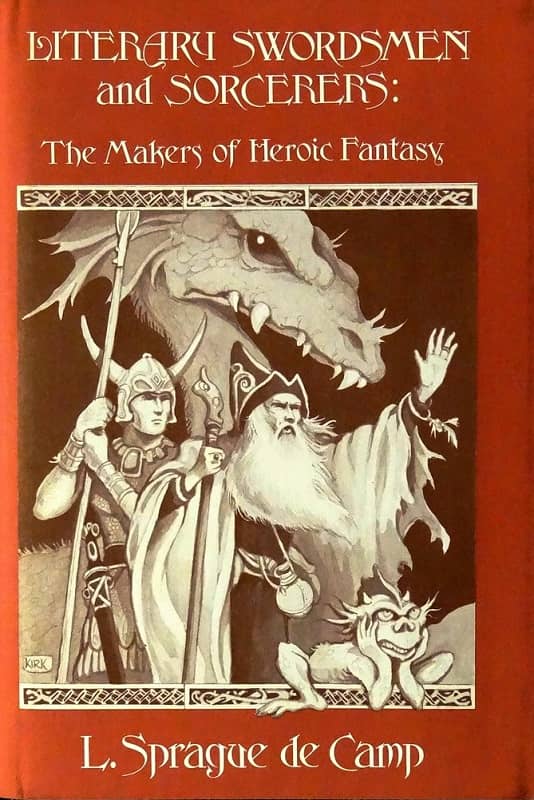 |
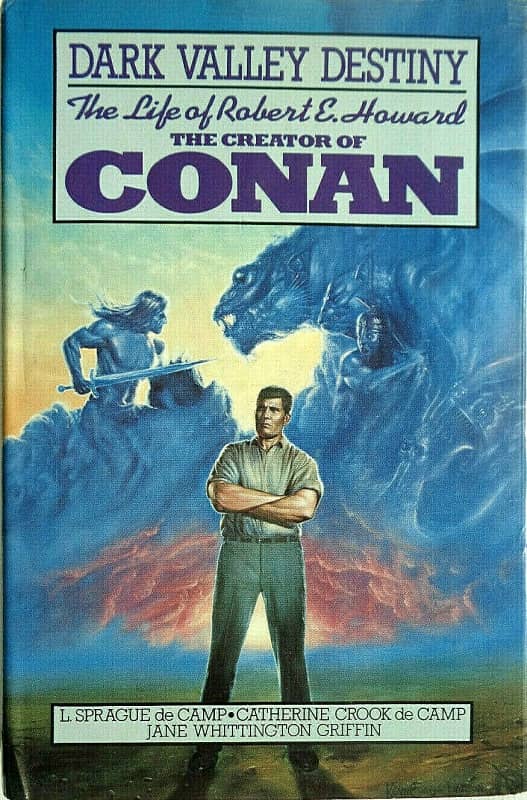 |
Literary Swordsmen and Sorcerers: The Makers of Heroic Fantasy (Arkham House, 1976) and
Dark Valley Destiny (Bluejay Books, 1983) Covers by Tim Kirk and Kevin Eugene Johnson
Robert E. Howard and prostitutes is a complicated and fascinating subject. Not only is there a question of whether he visited the ladies of the night, there was also the issue of whether he was a virgin. In his REH biography, Dark Valley Destiny (1983) L. Sprague de Camp wrote,
Some of Robert Howard’s admirers have stated in public that Robert patronized houses of prostitution. While we understand their wish to promote a macho image for the creator of Conan, all the evidence points the other way… the weight of such evidence as we have makes it more than likely that he died without ever having enjoyed the pleasures of sex.
Hiss quote about Howard’s virginity was contradicted by de Camp himself in his earlier book, Literary Swordsmen and Sorcerers: The Makers of Heroic Fantasy (1976). De Camp, paraphrasing Howard’s December 5, 1935 letter to H. P. Lovecraft, writes: “In 1935, he [REH] sold a story to the semi-pornographic Spicy Adventures; he said that he had used one of his own sexual adventures in the plot and urged H. P. Lovecraft (of all people!) to do the same.” A heavily edited version of this statement also appears in Dark Valley Destiny.
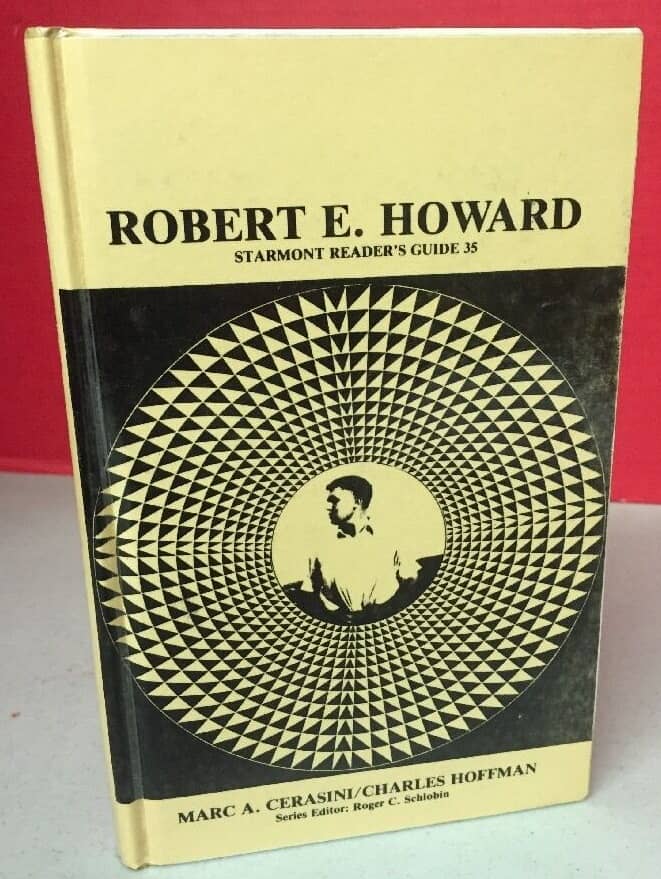 |
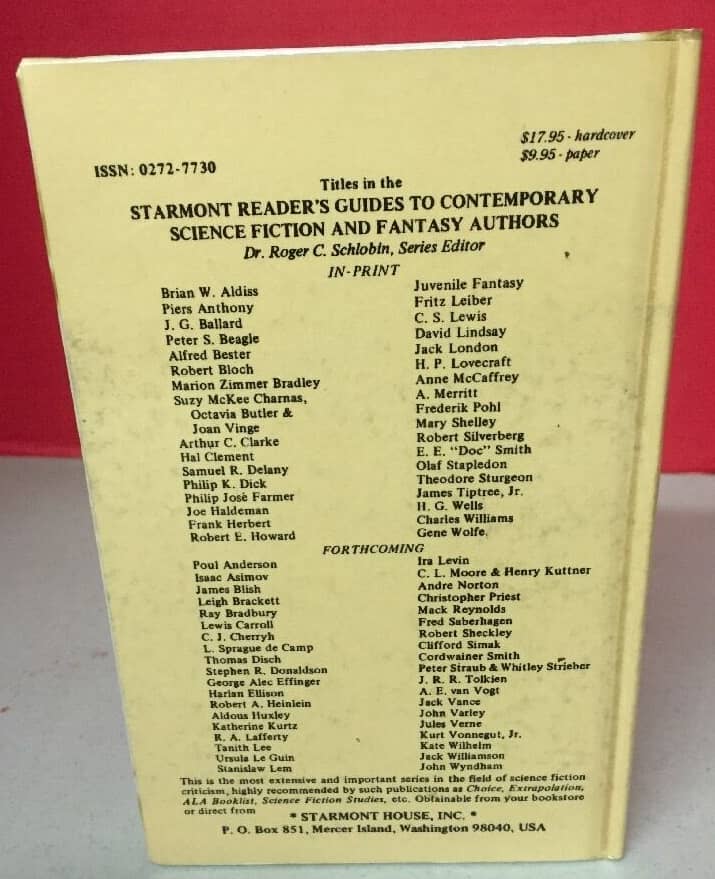 |
Starmont Reader’s Guide 35: Robert E. Howard (Borgo Press, 1987)
Marc Cerasini and Charles Hoffman also examined de Camp’s statement regarding virginity, “In an increasingly sex-conscious society, this is too damaging an assertion to allow it to go unchallenged and it behooves us to consider the evidence, both in support of and contrary to the de Camps’ theory.” After their examination, Cerasini and Hoffman concluded, “The unbridled eroticism in some of his poetry suggests to us he spoke from experience.” Robert E. Howard (Starmont Reader’s Guide 35, 1987)
And there was plenty of opportunity for Bob Howard to obtain that experience. According to Dark Valley Destiny there were three brothels in and around Brownwood. Did REH frequent them or any other places of prostitution available during his travels?
There is evidence that he did.
So Far the Poet… & Other Writings by Tevis Clyde Smith (REH Foundation Press, 2010)
Tevis Clyde Smith, a close friend, mentions a conversation between Bob Howard and his father, “‘Where are you going?’ asked Dr. Howard when Bob requested the car. Bob, irritated at being questioned, answered surily that we were going to the G.D. whorehouse. Dr. Howard, mollified, stated that he had asked because he was expecting a call to deliver a baby and would need the car. We took the car but were back before the labor pains started.” So Far the Poet… & Other Writings. Last chapter. (2010)
Also in So Far the Poet, Smith has a note, “the whore Bob saw in Piedras Negras [Mexico] outside, as he phrased it, ‘of the polite section.'”
One Who Walked Alone by Novalyne Price Ellis (Donald M. Grant, 1986)
Unlike Clyde Smith’s explicit statements, there are two references that hint at REH’s involvement with prostitutes. During one of her countryside drives with Bob Howard, Novalyne Price Ellis argues that a child born of a mixed marriage is just as good as the man who sired him and if a man wants to keep his race “pure” he shouldn’t go down to the flat. One Who Walked Alone (1986):
Bob jerked the wheel so abruptly we almost ran off the road.
“Well, damn it,” he groaned. “There something there that you don’t understand.”
He looked at me, ran his hand over his face, and glared, “Well, sometimes a man —
Well, damn it. Sometimes a man has to —”
He stopped, glared at me, sighed and settled back in his seat. “I’ll tell you the facts of life, even if you never speak to me again. Oh, well, damn it to hell —….”
Novalyne doesn’t mention if REH told her the facts of life nor does she say where “the flat” was located.
Another hint of Bob’s experiences with prostitutes comes from his HPL letter dated December 5, 1935. (Note this is the second time it is quoted here. See the Spicy Adventures incident above.) In it, REH recalls the time he, Clyde Smith, Lindsey Tyson and Truett Vinson “started to go somewhere, to a movie, or some other innocent pastime, but we started drinking whiskey, and that called for beer, and along about midnight we found ourselves in a den of iniquity in a county-seat town about fifty miles east of here. The beer was punk and the girls were worse — well, there was one I remember with pleasure, a blond with a figure like — well no matter.” The Collected Letters of Robert E. Howard (2008).
The Collected Letters of Robert E. Howard (Robert E. Howard Foundation Press, 2008)
As convincing as these statements may be, Howard’s erotic poetry about the ladies of the night offers more compelling evidence in the form of a first person point of view.
“Love’s Young Dream” describes his visit to a brothel. (First appearance in the unpublished book, Images Out of the Sky. poetry by REH, Lenore Preece and Clyde Smith. ca. 1928)
I saw the evil red light gleam
Above the brothel door;
I entered in as in a dream
And climbed the stair once more.I caught the stench of hairy men
And sweat and smoke and beer,
And cutting through the smudgy din
Her empty laugh rose clear.I stood within her littered room
That opened on the hall;
I saw the flasks of cheap perfume
And the pictures on the wall.Her hat was tossed on a broken chair,
A coat lay on the floor;
Cheap cigarettes made sick the air
That seeped through the sagging door.And all my dreams sank down to fade,
And yet the girl stood there,
That I had visioned a laughing maid
With a blossom in her hair.The girl I dreamed she might have been
Fades before she that is —
But I’ll forget as do all men
In passion’s barren bliss….
The poem is filled with sensory detail: the red light, cheap perfume, and clothes tossed helter skelter; the smell of stale beer and cheap cigarettes; the sweat of the men who climbed those stairs and her shrill, empty laugh. There is disappointment when thoughts of his dream girl fade with reality and resignation in the last two lines: “But I’ll forget as do all men/In passion’s barren bliss.”
Images Out of the Sky (Tevis Clyde Smith, 1966)
In contrast to the disappointment in “Love’s Young Dream,” “A Song from an Ebony Heart,” is filled with anger, bitterness and self-loathing. (Letter to Clyde Smith. ca. November 1928)
The wine in my cup is bitter dregs
The moon is hard and cold.
Like a woman that spreads her greedy legs
For a smear of slimy gold.My heart was the heart of a broken louse,
The jackal fired my eyes,
When I sought for peace in the bawdyhouse,
And rest in a harlot’s thighs.When I came from the silent midnight streets
Where the rain was sharp and fresh,
To foul my soul on the yellowed sheets
And tear at her burning flesh….But I was the brother to the bull,
My blood screamed in my brains,
My blood blasphemed beneath my skull
And clawed against my veins….Their arms are white but they grip like bars.
The candle gutters low,
I can nail the moon back over the stars
But my soul died long ago.
Despite the bleak ending in “A Song from an Ebony Heart,” not all Howard’s poetry about prostitutes is bitter or filled with disappointment. When REH writes about the oldest profession he sometimes speaks with two voices. The man’s point of view is filled with disillusion and anger but there is another side. One that is sympathetic toward prostitutes. Howard accomplishes this surprising change when he writes in the first person as a woman.
In “A Song of Cheer” he speaks with a female voice. (Letter to Clyde Smith. ca. 1928)
I was his mistress, she was his wife, that was the difference it made;
He wouldn’t have walked, to save my life, with me on the promenade.
Dignified with his family pride, formal and spick and span —
But up in my room — say listen kid, he was a different man!
I’ve seen all sorts of men perform when full of women and beer
But the damndest fools are these formal birds when they break
through their veneer.
If his wife could have seen him — up in my room — I’ll bet she’d
have bent at the knees —
Acting the fool with my step-ins on over his BVDs….
When “A Song of Cheer” changes direction and talks directly to the wife, REH redefines prostitution:
But, listen, dearie, we’re just alike, even though you are his wife
For he bought you just as he bought me — and he bought you for life.
There was a fellow, a slim young boy, who loved you all to Hell —
But you married this old bastard — say, what was that but a sell?
Why did you marry this old dub? You wouldn’t admit it kid,
But the boy, he didn’t have any coin and this old buzzard did.
You loved the boy, yes, I know you did, but you loved money
more,
So you sold yourself and you’re just like me, a wharfside
Barbary whore….
The wife wouldn’t appreciate being called a “whore” but Howard’s ladies of the night didn’t have that problem. In “Repentance”, as in most of his poems with the female viewpoint, the narrator enjoys what she does and has no regrets. Here she talks about her first man. (Letter to Clyde Smith. March 1928).
How is it that I am what I am
How did I come to fall?
Who was the man my soul to damn
Black in the sight of all?
Who was it came in my virgin hood
And in some evil hour
Turned all my life to bad from good
Bruising the tender flower?
I cannot remember the fellow’s name
I had long ago forgot;
I was young and my blood was flame
The person mattered not.
I was hot as a blazing brand
Blood and body and nerve
Ripe to be plucked by the first man’s hand
And any man would serve….
Years later, after her cheeks have grown sallow and her lips are faded, she still thrills to the hands of men,
My by-gone life is dim and far;
I am content with gin,
A slug of wine, sometimes at the bar,
A room for the sailormen.
The poems about the ladies of the night illustrate Howard’s poetic versatility. The women are all prostitutes but it’s Howard’s descriptions that give them individuality: an empty laugh, greed for gold and the enjoyment of men. These distinctive characteristics create the mood of each poem.
“Surrender (1)” gives us still another mood, one not seen in any of the above poems. (First appearance in the unpublished book, Images Out of the Sky, poetry by REH, Lenore Preece and Clyde Smith. ca. 1928)
I will rise some day when the day is done
And the stars begin to quiver;
I will follow the road of the setting sun
Till I come to a dreaming river.I am weary now of the word and vow
Of the winds and the winter weather
I’ll reel through a few more years somehow,
Then I’ll quit them altogether.I’ll go to a girl that I once knew
And I will not swerve or err,
And I care not if she be false or true
For I am not true to her.Her eyes are fierce and her skin is brown
And her wild blood hotly races,
But it’s little I care if she does not frown
At any man’s embraces….Enough for me if she has for me
A bamboo hut she’ll share,
And enough tequila to set me free
From the ghosts that leer and stare.I’ll lie all day in a sodden sleep
Through days without name or number,
With only the wind in the sky’s blue deep
To haunt my unshaken slumber.And I’ll lie by night in the star-roofed hut
Forgetful and quiet hearted,
Till she comes with her burning eyes half shut
And her red lips hot and parted….No man shall know my race or name,
Or my past sun-ripe or rotten,
Till I travel the road by which I came,
Forgetting and soon forgotten.
The “brown skinned girl” in “Surrender” is not the vision with flowers in her hair that he longs for in “Love’s Young Dream” nor is she the greedy “harlot” he describes in “A Song from an Ebony Heart.” The girl who goes to him with “burning eyes” and “red lips hot and parted” is entirely different. She is warm hearted as well as hot blooded and there is no mention of money. In fact, she appears to be supplying him with the tequila that sets him free.
Changing the male and female perspectives gives Howard’s poetry more depth and vitality and, best of all, more insight into the Poet himself. We’ve already seen his disappointment, anger, his self loathing, and his resignation to the disappointment that awaits in the room above as he climbs those brothel stairs once again. “Surrender” gives another kind of resignation: a sodden sleep to “escape from the ghosts that leer and stare”. It’s easy to picture him, a stranger among strangers, lying “forgetful and quiet hearted” under a starry sky in that roofless hut. With enough liquor, he may have accomplished the forgetting part but, ironically, it’s been close to a hundred years since “Surrender” was written and Robert E. Howard himself is still not forgotten.
Are these poems proof Bob Howard visited prostitutes? His words are very convincing. However, as his fiction and other poetry show, he had an extraordinary knack for describing places he never visited, using his extensive research and knowledge to give them life. The vivid details of brothels and prostitutes, as well as the descriptions of his hopes, dreams and disillusionment in the face of reality could have come from some imaginative source. But did they?
Slipcase edition of Dark Valley Destiny
Perhaps not. All the events in these poems can be accounted for in the “real” world. The man’s point of view can be easily explained as personal experiences. In “Repentance” and “A Song of Cheer” he gives the ladies a voice. How does he know their stories? In her book, Novalyne states whenever Howard was driving around the countryside and saw an old man sitting alone on a porch, he’d stop and visit, “just to hear his stories of the country when it was new and fresh and uncluttered with the trappings of civilization”. Knowing this, it’s easy to picture REH buying the night ladies a drink and listening to their stories much the same way he did with the old men on their porches.
Even the “brown skinned girl” could be explained by Clyde Smith’s reference to Piedras Negras, Mexico and from Howard’s own lines in “Surrender (1)”: “I will go to a girl that I once knew…. her eyes are fierce and her skin is brown….”
Of course, all this is speculation and, as compelling as it is, Howard’s poetry isn’t the only proof of his visits to prostitutes. Also to be considered are the confirmations from his close friends. Both Howard’s poems and his friends’ statements can stand alone as evidence and together, they make a solid argument that L. Sprague de Camp got it wrong.
Howard did visit brothels. Not only did he frequent them, Robert E. Howard wrote deeply moving poetry about the ladies of the night and the men who came to them seeking dreams, comfort and, as he told Novalyne, the things that “sometimes a man has to….”
Sincere thanks to Rob Roehm for his help.
Barbara Barrett’s last article for us was Tomorrow Isn’t Always Another Day: Remembering Howard Fast’s The Edge Of Tomorrow.
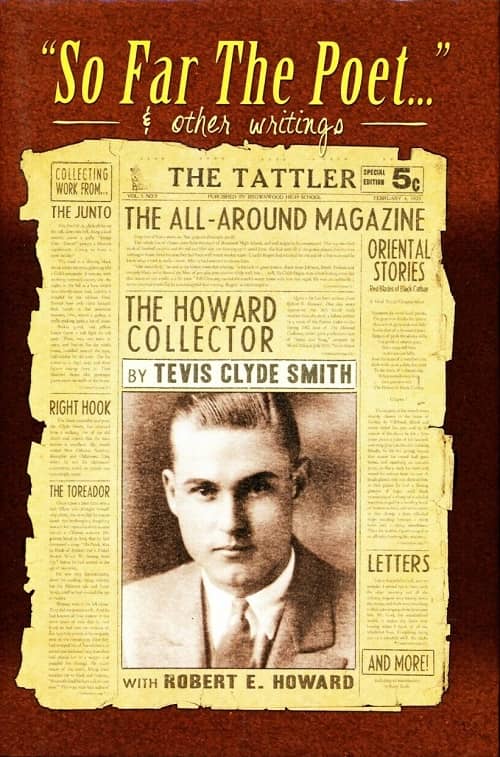
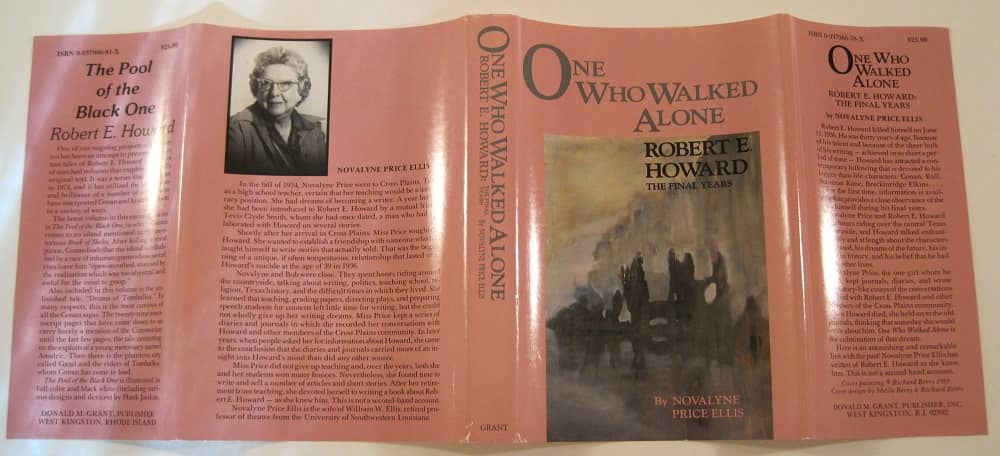
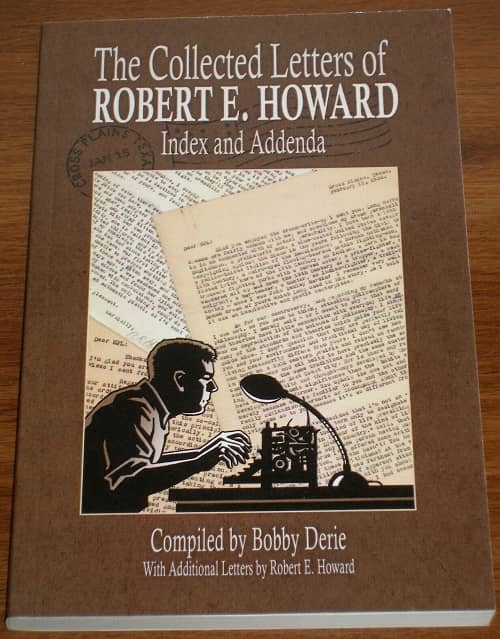
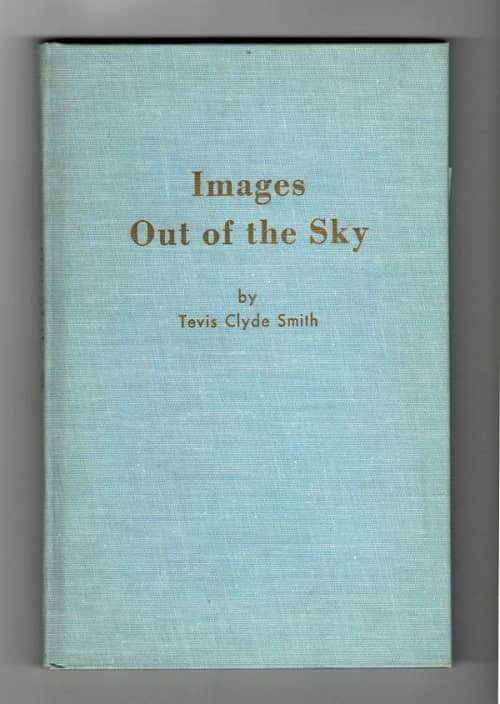
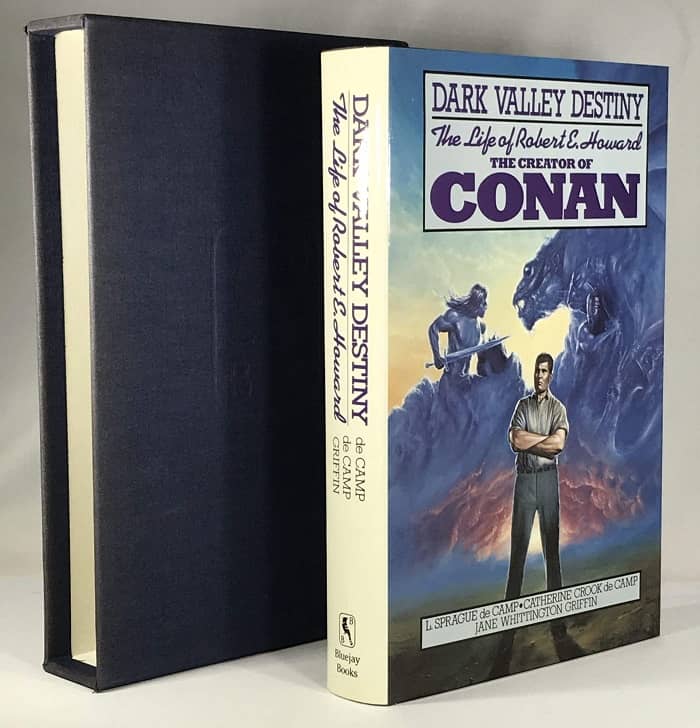
I don’t have any great insight into the man. I’ve read Novalyn Price’s book and a few letters. But my picture of him is as someone who wanted to live, here and there, like his larger-than-life creations. Conan would get roaringly drunk and wind up the night in a brothel, so I can certainly see Howard doing that as well.
While Howard’s literary abilities are rightly lauded, his biggest fans often prefer to see him as not unlike his creation. When I try to picture Howard, I tend to imagine myself walking into Robertson’s Drug Store at the height of some hot Texan afternoon and ordering an ice-cream soda off the big, plump young man in a white shirt and a dickie bow behind the counter. He’s spent most of his life in this small town and still lives with his Mom and Dad but there’s something about the eyes that suggests a vivid inner life. He’s the sort of guy who may have visited a few of the town brothels in his time, but without ever partaking of what was on offer. Or so I reckon
Thought provoking as always, Barbara. As with many things with REH, there is some conflicting information about the situation. On the other hand, REH was the kind of guy who would get into a boxing ring and go a few rounds, so he probably could have sampled the wares of a brothel. As he wrote a lot of westerns I can also imagine him going to one with innocent intentions to ‘do some research’ and once your in the door….